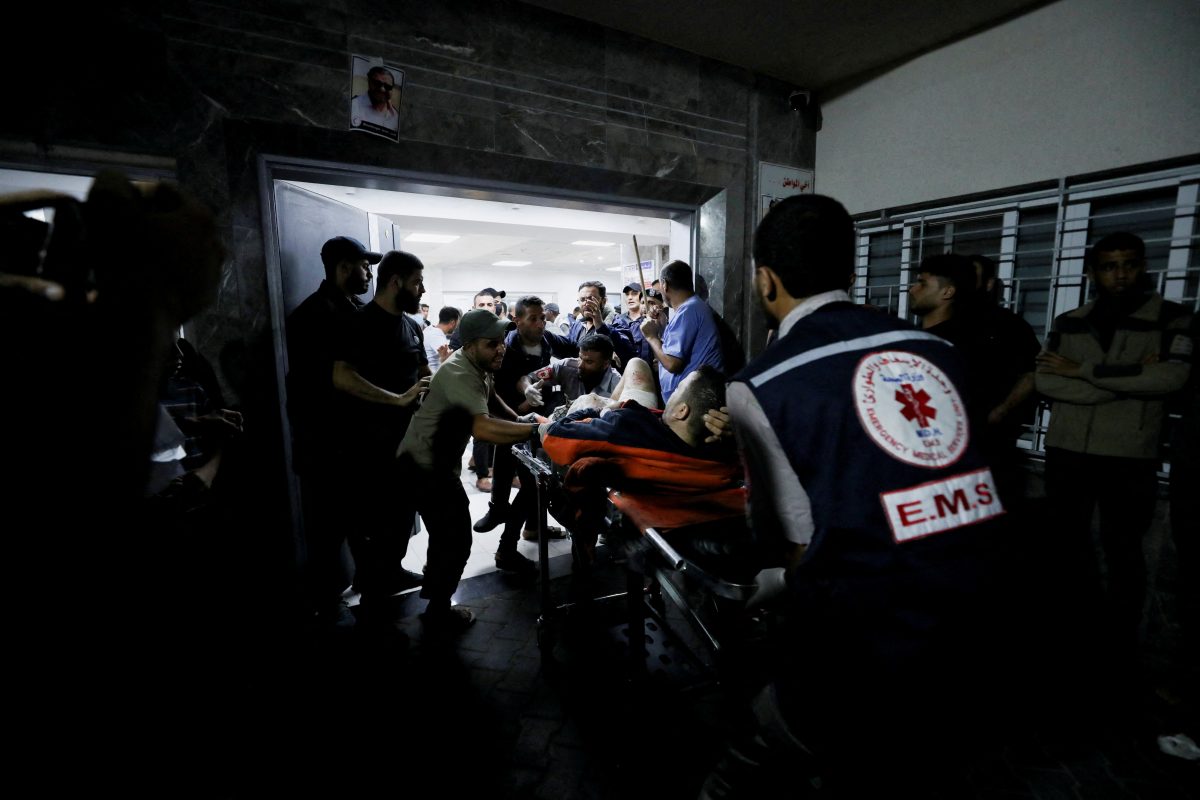GAZA, (Reuters) – Gaza authorities said an Israeli air strike today killed about 500 people at a hospital in the Palestinian enclave, but Israel said a Palestinian rocket had caused the blast.
The death toll was by far the highest of any single incident in Gaza during the current violence, triggering protests in the occupied West Bank, Istanbul and Amman.
The health minister in the Hamas-run government of Gaza, Mai Alkaila, accused Israel of “a massacre” at Al-Ahli al-Arabi Hospital. The strike killed hundreds of people and occurred during Israel’s intense 11-day bombing campaign in Gaza.
Earlier a Gaza civil defence chief said 300 people were killed and a health ministry official said 500 were killed. Hamas said the blast mostly killed displaced people.
A spokesperson for the Israeli military said analysis by its operational system showed “an enemy rocket barrage” aimed at Israel was passing the hospital at the time of the strike and blamed the Palestinian Islamic Jihad militant group.
Israeli Prime Minister Benjamin Netanyahu said “barbaric terrorists” in Gaza had attacked the Gaza hospital, not Israel’s military.
Islamic Jihad denied that any of its rockets were involved in the hospital blast, saying it did not have any activity in or around Gaza City at that time. Iran-backed Islamic Jihad took part in the Hamas-led assault on Israel on Oct. 7 and, like Hamas, has fired numerous salvoes of rockets into Israel.
News of the hospital strike and high death toll prompted condemnation from many countries on the eve of U.S. President Joseph Biden’s visit to Israel. Russia and the United Arab Emirates demanded a U.N. Security Council meeting and clashes erupted in the West Bank.
Earlier on Tuesday the United Nations said an Israeli strike had hit one of its schools where at least 4,000 people were sheltering. The agency said six people were killed and dozens injured by the strike. Israel’s military said it was looking into that report.
Health authorities in Gaza said prior to Tuesday’s incident at least 3,000 people had been killed in Israel’s 11 days of bombing since Hamas militants rampaged into Israeli towns on Oct. 7, killing more than 1,300 soldiers and civilians.
Displaced people fleeing the Israeli bombardment have flocked to hospitals, seeking refuge around them in hopes they will be safer.
Last week Israel ordered all people living in the northern half of the Gaza Strip, which is only 45 km (25 miles) long and home to 2.3 million people, to leave their homes and go south.
However, the air strikes have pounded targets throughout the enclave and despite expectations of an Israeli ground offensive, some displaced people have started returning north.
The World Health Organisation said the attack on the hospital was “unprecedented in its scale”. It said earlier on Tuesday there had been 115 attacks on healthcare facilities in Gaza and the majority of its hospitals were not functioning.
Israel has cut off all power, water, food, fuel and medicine supplies into Gaza since the Hamas attack, intensifying an existing blockade of the enclave.
The WHO said it urgently needed access to Gaza to deliver aid and medical supplies, warning of a long-term humanitarian crisis. Egyptian aid trucks were waiting at the border into Gaza but there was no agreement to allow them in.
CONDEMNATION
Countries including Canada, Egypt, Turkey, Jordan and Qatar condemned the strike on the hospital.
In the West Bank, where the internationally recognised Palestinian Authority operates, Palestinian protesters clashed with Palestinian security forces, who fired tear gas to disperse them. Palestinian Authority President Mahmoud Abbas cancelled a meeting with Biden.
Video obtained by Reuters showed several ambulances arriving at another Gaza hospital carrying people injured at Al-Ahli al-Arabi hospital. One man was staggering, bleeding heavily from the head. A boy was being carried on a stretcher.
Anglican-run Al-Ahli al-Arabi was damaged by Israeli rocket fire on Sunday, according to a statement by the Archbishop of Canterbury Justin Welby, who appealed for health facilities to be protected.






